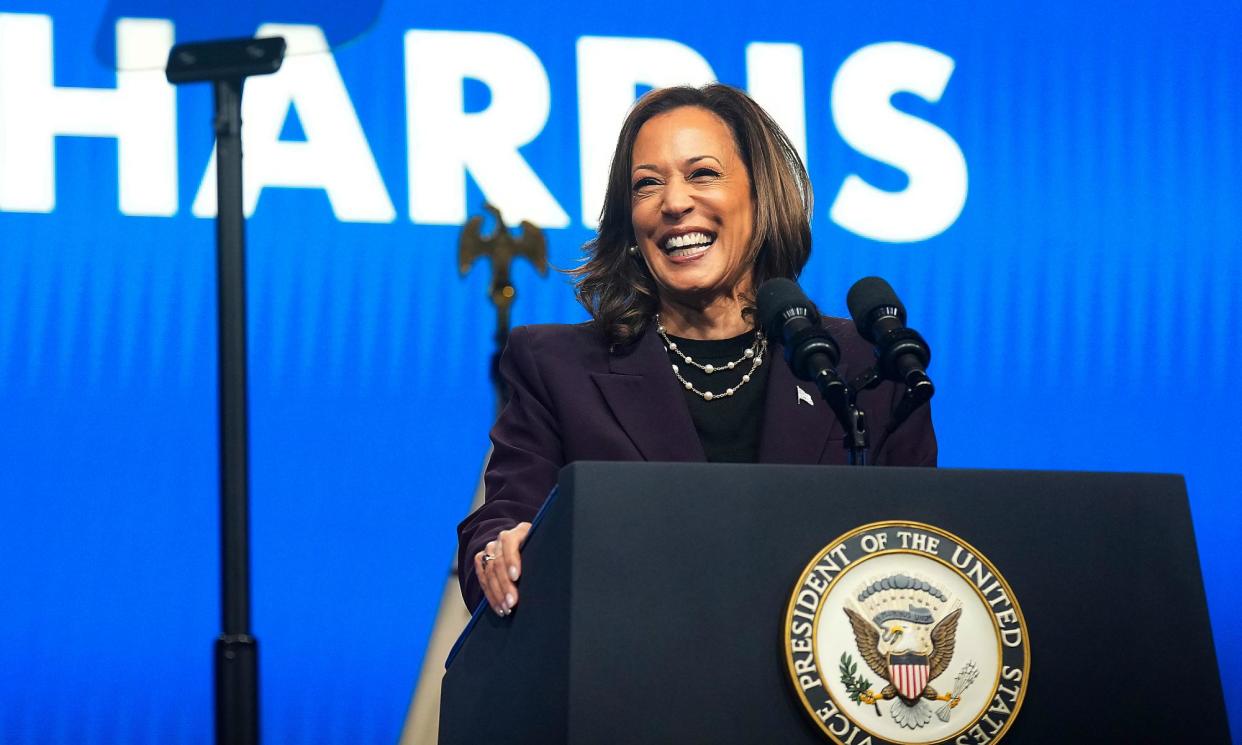Record-breaking Zoom supporting Harris mobilizes white female voters

Following the success of a virtual call to mobilize Black women voters for Kamala Harris, a similar event with more than 160,000 attendees was held on Thursday aimed at white women, and appeared to break records.
White women will be a key demographic for the Democrats to win over this election.
The presidential campaign of Harris, who would become America’s first female president if she were to win for the Democrats in November, and would become the first Black woman and south Asian woman to be a major party’s presidential candidate if she is confirmed at the Democratic national convention next month, has taken off quickly since Joe Biden announced last Sunday he would step aside from his re-election campaign.
Time to organize a white women conference call like the Black women and men have to support Vice President Kamala Harris.
Who’s in?— Shannon Watts (@shannonrwatts) July 23, 2024
“It’s our turn to show up. So that’s what we’re doing. Hold this date and time,” read the virtual flyer for an event calling for white women – the majority of whom tend to vote Republican – to mobilize for Harris shared widely on social media.
“White Women: Answer the Call”, a Zoom call inspired by the call for Black women held earlier this week, saw 164,000 white women join, reportedly setting a world record as the largest Zoom meeting in history. Nearly $2m was raised for Harris in less than two hours on Thursday night.
The Zoom call that started it all was hosted on Sunday by Win With Black Women, a group of Black women leaders and organizers, within hours of Biden’s decision, and saw an astonishing 44,000 participants, raising more than $1.5m for Harris’s budding campaign.
The tens of thousands of those who couldn’t access that call because it was at capacity streamed it through other platforms such as Twitch, Clubhouse and YouTube.
It was just one of several calls hosted by the group since 2020, when it was founded by strategist Jotaka Eaddy.
A Win With Black Men call also inspired by the call with Black women raised more than $1.3m to support Harris from more than 17,000 donors on Monday.
Shannon Watts, a prominent gun control activist, organized Thursday’s event, which featured speakers including actor Connie Britton, former US soccer star Megan Rapinoe, the US House representative Lizzie Fletcher and the musician Pink. The group had raised more than $8.5m by Friday afternoon, Watts tweeted.
NEW: We've raised over $8.5 million so far!
All from last night’s Zoom of nearly 200,000 women answering the call for Kamala Harris.
Thank you @WinWithBLKWomen for showing us how it’s done.
Help us get to $10 million: https://t.co/ruTF35YYDC— Shannon Watts (@shannonrwatts) July 26, 2024
Exit polls found 52% of white women eligible to vote in 2016 cast a ballot for Donald Trump, a figure which likely helped tilt the election in Trump’s favor. At the time, he was running against Hillary Clinton, who hoped to be the first female president. In 2020, the majority of white women voted for Trump again.
“A majority of white women have voted for the Republican candidate since the 2000 presidential election when white women were almost equally split between Democrat Al Gore and Republican victor, George W Bush,” according to the Center for American Women and Politics at Rutgers University.
“In contrast, a large majority of Black, Latinx and Asian women have supported the Democratic candidate for the entirety of the time period in which data disaggregated by gender and race has been available.”
Watts said she hopes history will not repeat itself.
“Fellow white women: we can and have to fix this, and that starts with mobilizing like Black women,” Watts wrote on Instagram ahead of the call. She linked to a Substack post she wrote, which read in part: “White women voting for Republicans, even when it appears to be against their best interests, is a complex phenomenon influenced by privilege, systemic racism and sexism, religious affiliations and, of course, the patriarchy.
“But we’re not a monolithic group; our voting patterns are typically divided along lines of religion, education and marital status, and that division makes us not only a crucial voting bloc, but an unpredictable one – even small shifts in our voting behavior can have significant impacts on election outcomes.”
Watts added: “In other words, if we start doing the work right now, we can create a shift in voting momentum that will help Black women elect Vice-President Harris as president in just 100 days.”
